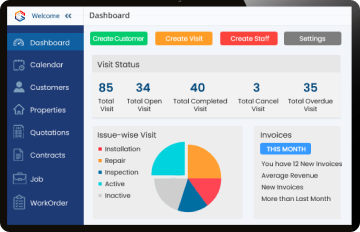An inventory management system is essential for businesses in retail, wholesale, and other sectors to streamline inventory processes. Especially when managing large inventories or multiple warehouses. This software simplifies monitoring, tracking, and maintaining inventory, whether it includes raw materials, company assets, or finished products. Often integrated with purchasing, accounting, and customer systems, it provides a centralised platform for managing warehouses and supports effective supply chain decisions through data-driven insights.

The Advantages of Using An Inventory Management System
Companies choose inventory management systems for numerous benefits, particularly for optimizing the way the inventory is managed. Here are some crucial benefits of using this system:
1. Centralized process
Companies usually have more than one stock location, which makes it quite difficult to keep an eye on every product category. The more warehouses are there, the more challenging it is to manage the orders. However, using an inventory management system, you can use the automated system to find an item quickly, check its availability and expiry data, track couriers, and process orders.
2. Stock Management
An inventory system helps track and manage stock. Before handling an order, you must check if the product sits ready in the inventory. If it’s missing and an order goes through, the customer might feel disappointed.
If the inventory already holds plenty of a product, ordering more creates unnecessary clutter. An inventory management system solves this problem. It shows stock levels clearly and prevents over-ordering or shortages.
3. Improved efficiency
As already stated, inventory management is a very complex activity. However, by using an automated software, you can make everything simpler and efficient. For instance, if you want to make an inventory report by the end of the month, you can simply rely on the software to generate an analysis. In this way, you won’t have to cramp over excessive paperwork. An automated system also reduces the chances of errors.
4. Minimal Costs
With increased efficiency and productivity, an inventory management system also prevents financial losses. Manual paperwork is prone to human errors. Unnecessary purchases, excessive stock storages, and late deliveries are also likely if you are not sure of your stock levels.
However, with an integrated and automated system, you won’t have to spend your resources on managing the inventory and dealing with the errors. An automated software also frees up the responsibilities of the workers, allowing them to spend their time on tasks that are more important.
5. Enhanced Customer Satisfaction
Inventory management software boosts customer happiness. It ensures orders are completed smoothly. Real-time updates help the team confirm product availability. Shipment tracking keeps customers informed and ensures timely delivery.
Many inventory systems link with CRM software. This allows customers to reach the business easily. It helps resolve their questions quickly.
6. Improved Reporting & Forecasting
This software also helps plan and forecast the inventory needs of the business. With appropriate inventory reports, the business can find which products are high in demand, which ones need to be reordered, and how long raw materials can last in the future.
All of this data is crucial to make effective decisions, coming up with an appropriate strategy, and improving the productivity of the business.
Types of Inventory Management Systems
1. Perpetual Inventory Management Systems
These systems continuously track inventory changes in real time, integrating with sales and purchase data to provide updated stock levels. They are suitable for businesses with high-volume sales or multiple stock locations.
2. Periodic Inventory Management Systems
A simpler approach that relies on manual stock counts at set intervals (weekly, monthly, or quarterly). Best for smaller businesses with limited inventory.
3. Barcode Inventory Systems
These systems use barcode technology to track inventory. Every product is tagged with a unique barcode, allowing businesses to scan and record stock levels automatically.
4. Radio Frequency Identification (RFID) Systems
Advanced systems that use RFID tags to transmit data about stock in real time. They are ideal for large warehouses or supply chains.
5. Cloud-Based Inventory Systems
Hosted on cloud servers, these systems allow businesses to access inventory data from anywhere, making them a flexible solution for e-commerce and retail businesses.
Key Features of Inventory Management Systems

Although not all inventory management systems software come with the same features and the software specs differ according to the industry needs, there are some features that you need to consider. We recommend searching for these features when you are looking for an inventory management system:
1. Stock Management
Using this feature, your company can monitor the movement of the stock or products from one place to another. Especially when the goods come out of the warehouse, stock management can update the data in real-time and allow all the system users to see the changes.
2. Procurement Management
With this feature, the system features can set the minimum levels of stock that should be present at any time in the inventory. So whenever the stock level is below the required amount, the system can alert the users. With timely notifications, the users can then reorder the product and avoid any sort of hassle.
3. Barcode Scanning
Barcode scanning is particularly beneficial for those working in the wholesale and retail industries. Using this feature, you can create barcodes automatically and label them easily. An efficient inventory system also ensures that the products can be searched using the barcodes.
4. Supplier Management
This feature allows the management to manage, store, and organize all the information associated with the companies’ suppliers. The users can easily search for the supplier who can support product delivery. They can also compare the prices offered by the suppliers.
5. Shipment Tracking
Shipment tracking is crucial for both management and customers. Since the company relies on a third party for shipment, it needs to ensure that the items are in safe hands. On the other hand, customers also want to know when they will receive their products. A shipment tracking feature allows customer service to answer their queries regarding delivery.
6. Inventory reporting & analysis
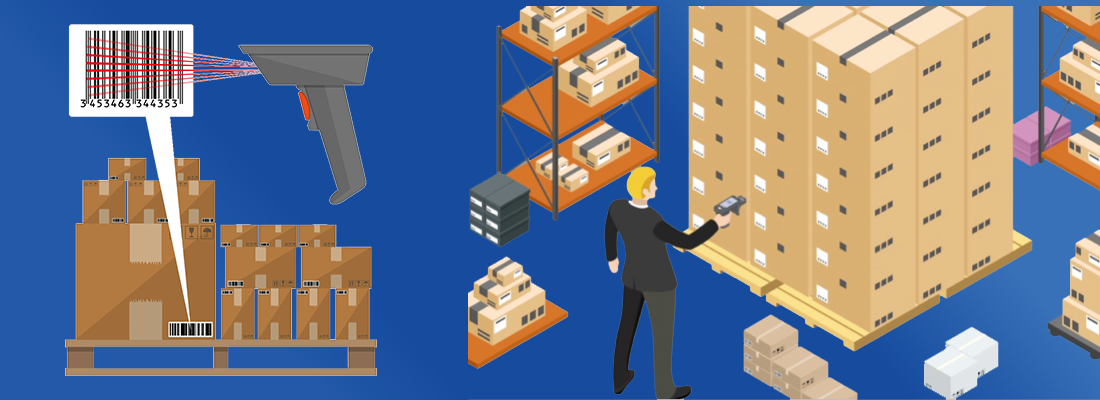
An effective inventory software system also helps in reporting. A complete overview of analytic data can be seen with a single tab using such a system. Be it stock movements, inventory turnover, stock valuations, or stock quantities, an inventory management system makes it easy to view the data in real time and make effective business decisions.
Challenges of Inventory Management
Managing inventory is not without its challenges. Businesses often face the following issues:
- Sudden demand changes lead to overstocking or stockouts.
- Difficulty maintaining accurate inventory counts.
- Supply chain disruptions cause delays.
- Limited storage space reduces efficiency.
- High costs of carrying, ordering, or running out of stock
Best Practices for Inventory Management Systems
- Minimise stock levels by ordering inventory as needed.
- Periodic physical checks ensure system accuracy.
- Use historical data to establish precise reorder levels for each product.
- Link inventory systems with accounting, CRM, and ERP platforms for seamless operations.
- Ensure all relevant staff understand how to use the system effectively to prevent errors.
Top Companies In Singapore for Inventory Management System Software
1. Genic Solutions
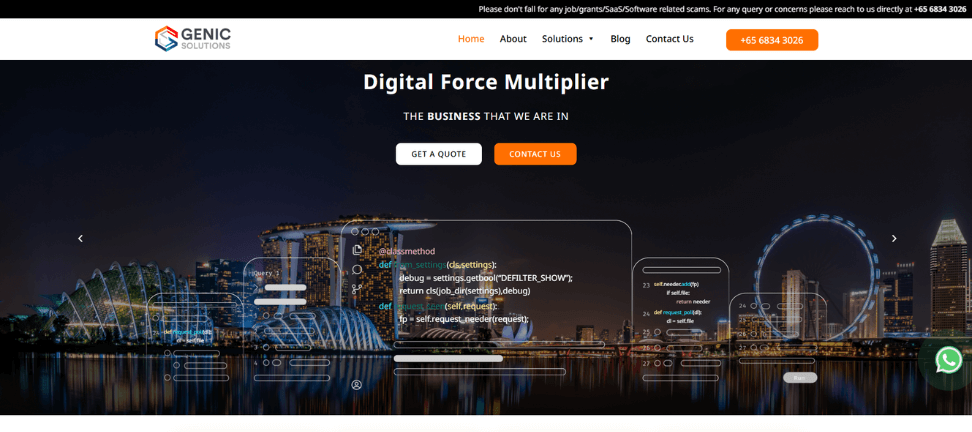
Genic Solutions provides a versatile inventory management system designed for businesses across various industries, including retail, logistics, healthcare, and manufacturing. Its user-friendly software automates inventory tracking, enhances order management, and integrates seamlessly with other business tools. By offering real-time stock updates and mobile app compatibility, it supports companies in optimizing stock levels, reducing costs, and improving customer satisfaction.
Features
- Real-time inventory tracking and updates.
- Automation of processes to reduce errors.
- Multi-channel integration with platforms like Shopify and Lazada.
- Mobile app for inventory management on the go.
Pros● The scalable solution is suitable for both startups and large enterprises. ● Mobile-friendly for ease of use and accessibility. |
Cons● Customization options might require time to tailor to unique needs. |
Website: https://www.genicsolutions.com/
2. ClickUp

ClickUp is primarily a project management tool that extends its functionality to inventory management through features like ClickUp Inventory. It provides templates for tracking stock movement, availability, and other aspects of inventory management, making it a versatile tool for businesses that need a customizable system to align inventory with project management.
Features
- Simplifies the management of large or complex inventories.
- Analyses inventory trends for informed decisions.
- Customizable dashboards and interfaces.
- Provides a 360° view of product data.
Pros● Comprehensive dashboards for holistic management. ● Inventory management templates simplify setup. ● Highly versatile with other project management functionalities. |
Cons● Steep learning curve for beginners. ● The mobile version can be sluggish. |
Website: https://clickup.com/
3. Katana
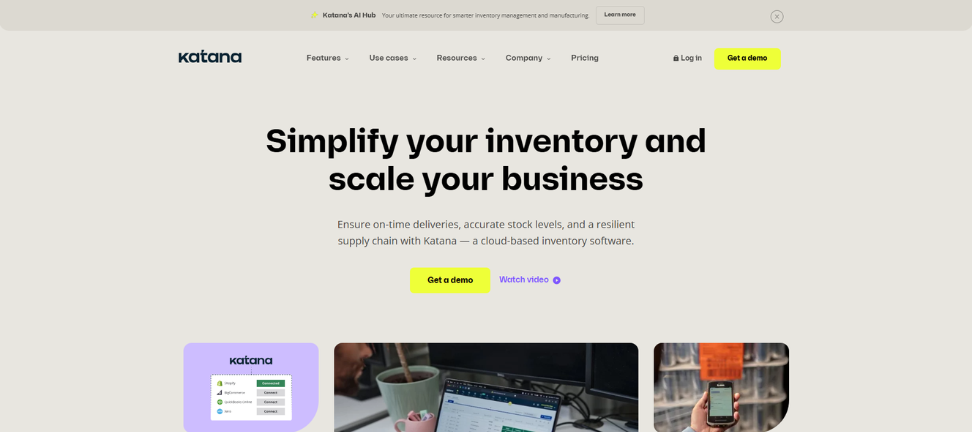
Katana is a cloud-based platform tailored for small to medium-sized businesses in manufacturing and inventory management. Its robust inventory tracking and order management capabilities ensure smooth operations, including control over raw materials, finished goods, and work-in-progress.
Features
- Multi-channel sales and production management.
- Traceability of materials and stock.
- Integrations with popular e-commerce platforms.
- Custom SKU management.
Pros● Excellent implementation support. ● Ideal for manufacturing-centric inventory management. ● Integration with multiple platforms like Shopify and WooCommerce. |
Cons● Not ideal for drop-shipping businesses. ● Limited functionality for enterprises or larger businesses. |
Website: https://katanamrp.com/
4.Ordoro
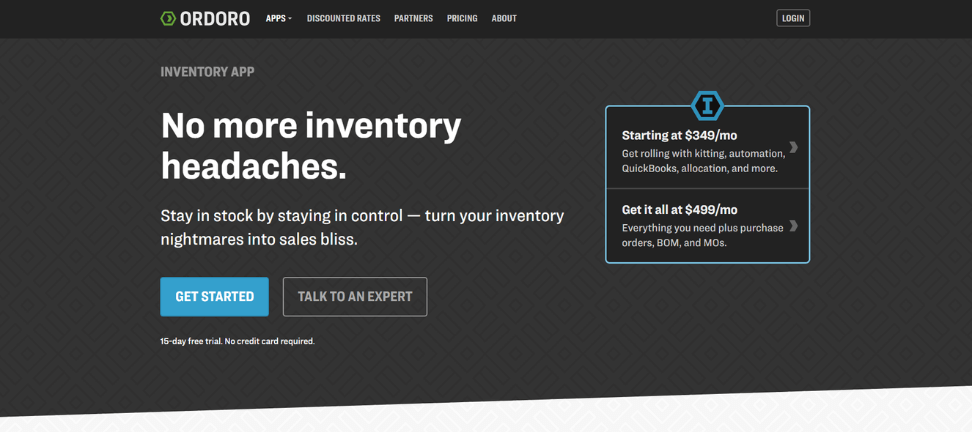
Ordoro focuses on e-commerce inventory management, providing tools to enhance warehouse operations and multichannel sales efficiency. It’s suitable for growing businesses aiming to scale while maintaining operational efficiency.
Features
- Complete inventory process management for e-commerce.
- Integrates with multiple sales channels for smoother workflows.
- Tools for creating return labels and managing shipping options.
Pros● Effective for multichannel fulfilment. ● Simplifies shipping and label creation. ● Great for scaling small to mid-sized businesses. |
Cons● No dedicated mobile app. ● Hourly updates limit real-time accuracy. |
Website: https://www.ordoro.com/features/inventory-management
5. Fishbowl
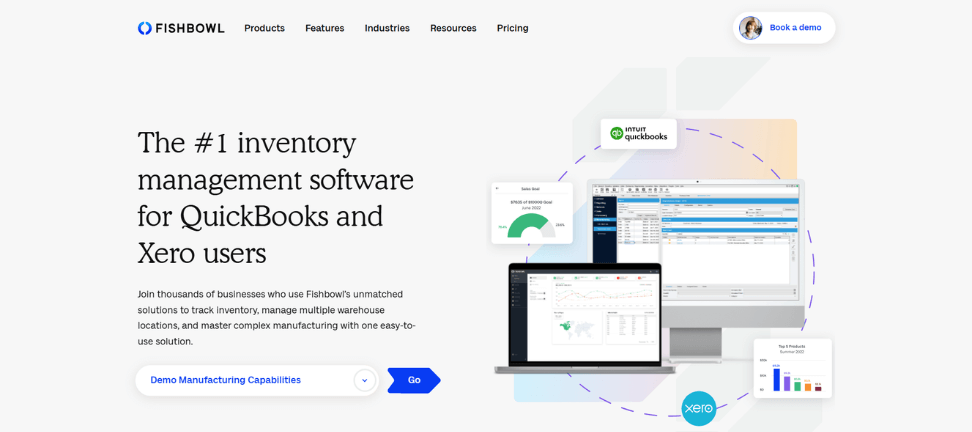
Fishbowl provides robust inventory management solutions for manufacturing, warehousing, and distribution businesses. Its detailed inventory tracking and automated processes ensure optimized stock handling and streamlined operations.
Features
- Tracks inventory across multiple locations.
- Auto purchasing and vendor management.
- Comprehensive reporting and analytics tools.
Pros● Strong inventory tracking and multi-channel integration. ● Scalable for business growth. ● Useful reporting tools for analytics-driven decisions. |
Cons● The steep learning curve for new users. ● High cost of implementation and maintenance. |
Website: https://www.fishbowlinventory.com/
6. SAP

SAP Inventory Management software integrates seamlessly with ERP modules, providing comprehensive tools to manage inventory efficiently. Designed for large-scale businesses, it enables tracking of stock movements, inventory categorization, and data analysis.
Features
- Inventory tracking and valuation.
- Batch management and goods receipt processing.
- Detailed reporting and analysis tools.
Pros● Enhances financial and operational management. ● Suitable for large-scale businesses with complex needs. ● Real-time inventory monitoring. |
Cons● Expensive with lengthy implementation timelines. ● Complexity may require extensive training. |
Website: https://www.sap.com/index.html
7. ShipBob
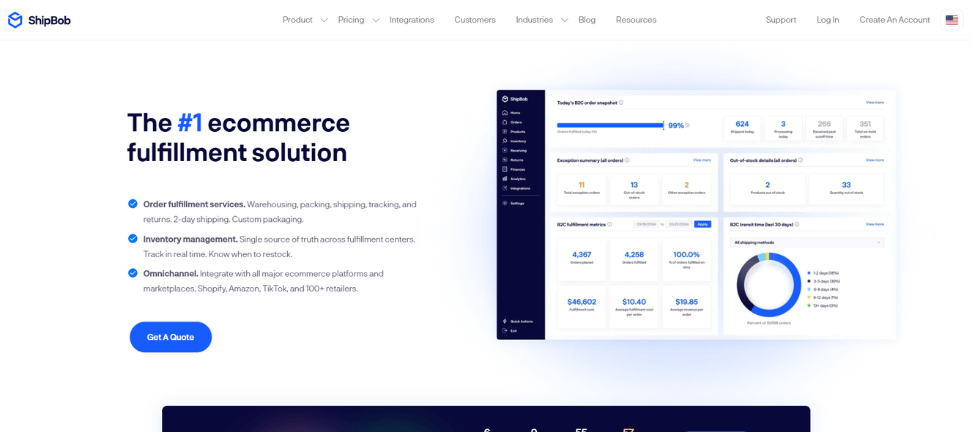
ShipBob is an inventory and fulfilment platform tailored for e-commerce businesses. It offers end-to-end visibility into stock levels, order statuses, and shipping across multiple warehouses, helping businesses streamline their supply chain.
Features
- Multi-channel inventory tracking and fulfilment.
- Real-time data on shipping and order statuses.
- API access for custom integrations.
Pros● Supports distributed warehousing. ● Integration with major e-commerce platforms. ● Real-time inventory insights. |
Cons● Higher fulfilment costs for small businesses. ● Complex pricing structure with potential support challenges. |
Website: https://www.shipbob.com/
Conclusion
An effective inventory management system for small businesses is essential to streamline operations, reduce costs, and enhance customer satisfaction. By leveraging advanced features like real-time tracking, automated processes, and detailed reporting, companies can improve efficiency and make data-driven decisions.
So if you are looking for an inventory management software company, make sure it is reliable and trustworthy. An inventory management system can surely advance your short-term and long-term growth while cutting the cost required to manage the inventory. As the business world is becoming more competitive, an effective inventory management system must automate your operations, manage the company’s most essential resources, compete in the market, and win the customers’ hearts.
Related Article:
The Future of Inventory Management: Trends and Innovations to Watch






